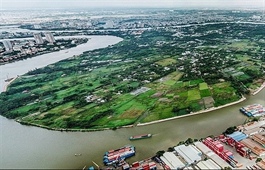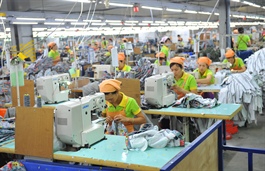Climate change interrupts operations of half of Vietnamese enterprises
Climate change interrupts operations of half of Vietnamese enterprises
As one of the countries most affected by extreme climate events, climate change has multifaceted negative impacts on activities of Vietnamese enterprises.
Fifty four percent of enterprises in a survey of 10,356 participants conducted by the Vietnam Chamber of Commerce and Industry (VCCI) and the Asian Foundation in Vietnam said they had to suspend operation because of climate change.
This was followed by a decrease in labor productivity due to inclement weather and the decline of revenue (both at 51%).
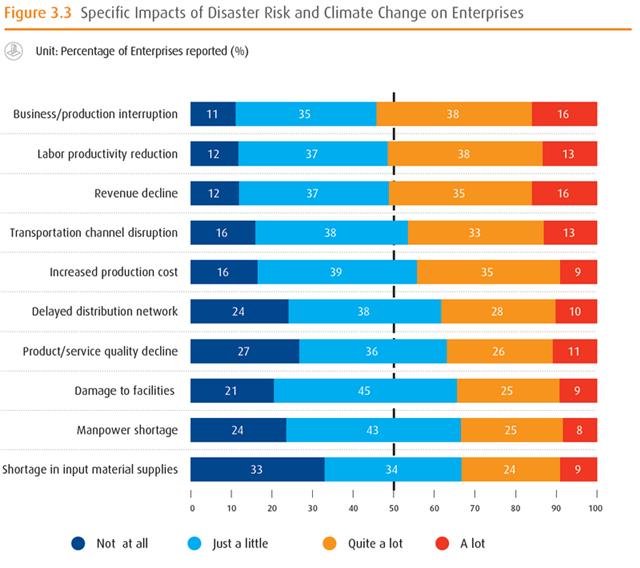
Source: VCCI's report.
|
Meanwhile, 46% of respondents reported disruptions in their transportation channels (46%) and 44% reported increase in production and business costs (44%).
The report, released on September 16, also revealed natural disaster risk and climate change caused stagnation in the distribution system of 38% of surveyed businesses, reduction of product and service quality (37%), damage to facilities (34%), manpower shortages (33%), and lack of supply in input production materials (32%).
“Vietnam is one of the countries most affected by extreme climate events,” said VCCI Chairman Vu Tien Loc at the launching ceremony, citing a World Bank study that climate change may affect about 1.5% of Vietnam’s GDP each year and the damage may increase in the future.
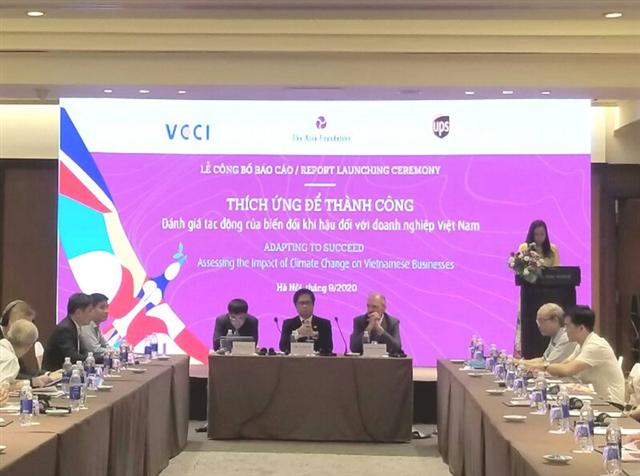
Overview of the conference. Photo: Ngoc Thuy.
|
In this context, Mr. Loc said enterprises in Vietnam’s central coast region are more exposed to natural disaster risk and climate change compared to other regions while those operating in agriculture, forestry and fisheries are the most vulnerable.
“Notably, newly created enterprises, or those with less than three years in operation, are more affected than the other groups,” Mr. Loc said.
Going further into impacts of climate change and natural disaster risks on activities of enterprises, Head of the VCCI's Legal Department Dau Anh Tuan said 7,643 enterprises revealed the median number of interruption days in the past year due to climate change was about seven working days.

Source: VCCI's report.
|
On average, the number of disrupted workdays was up to 16 days (on the average), Mr. Tuan added, while some enterprises said the number of interrupted days was over 100 days (confirmed by 1.5% of respondents), and there were some cases in which the total number of interrupted days was nearly half a year.
“Whether measured by median or average values, domestic enterprises had a much higher interruption time than their foreign-invested peers,” Mr. Tuan informed.
Compared to other regions, enterprises in the northern mountainous area, central highlands and central coast regions had significantly higher interruption intervals due to the phenomena of natural disasters and climate change, he continued. Among them, those in the mining sector had the highest rate of days interrupted, followed by the construction and agriculture, forestry, and fisheries sectors.

Source: VCCI's report.
|
Meanwhile, 6,225 businesses when providing information on the total value of losses last year due to issues related to climate change said the common loss for businesses was about VND20 million (US$860) and the average value of losses for an enterprise was about VND95.2 million (US$4,100).
Mr. Tuan noted nearly 100 businesses reported losses of over VND1 billion (US$43,023), accounting for about 1.6% of the respondent businesses while the data also indicated that the losses of local firms were larger than that of foreign ones.
Active response to climate change
As the climate change issue is causing negative impacts on enterprises, Mr. Tuan said more and more local firms are responding to the risk, including changing their business practices or upgrading production technologies.
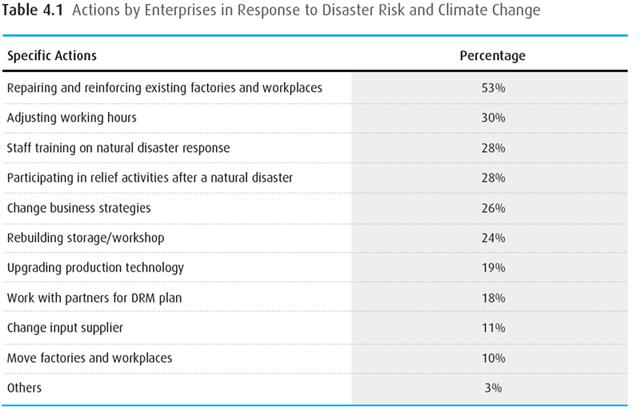
Source: VCCI's report.
|
Mr. Tuan also said the fact that many businesses have participated in contributing and responding to the consequences of natural disasters, with cash being the most popular form of contribution, followed by the support of facilities/vehicles, human resources and services is the sign of business positive response to climate change.
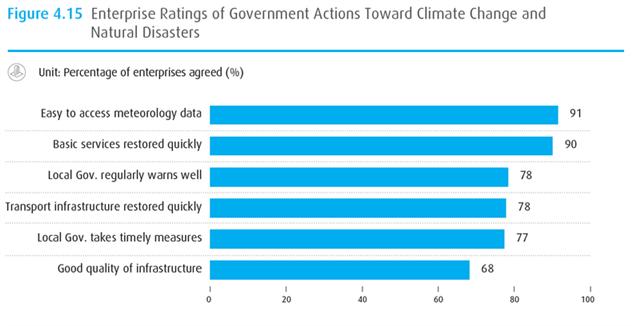
Source: VCCI's report.
|
Despite difficulties, enterprises have relatively positive assessments regarding government readiness in response to natural disasters. According to the report, up to 91% said they had easy access to local weather information and data. 90% of enterprises reported that right after a natural disaster occurred, basic infrastructure (electricity, water supply, and telecommunications) is repaired in a timely manner, and most of the time is ready to use immediately.
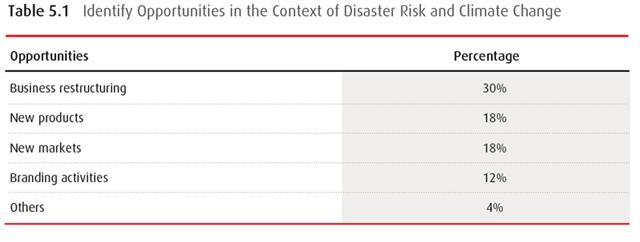
Source: VCCI's report.
|
Additionally, they are also optimistic about opportunities in the context of climate change, in which they could restructure production, create new products and services, among others.
“On average, businesses are willing to pay up to 7.32% of their operating costs for being more environmentally friendly,” Mr. Tuan stated.
However, in order to further motivate businesses to increase their resilience against climate change, Mr. Tuan said the government plays an essential role, especially in creating an enabling business environment for businesses.
At the same time, it is necessary to focus on improving the quality of labor in localities, more specifically, the quality of universal education and vocational education to better meet the labor demand of enterprises.







